How To Soundproof a Bifold door? {7 Proven Ways}
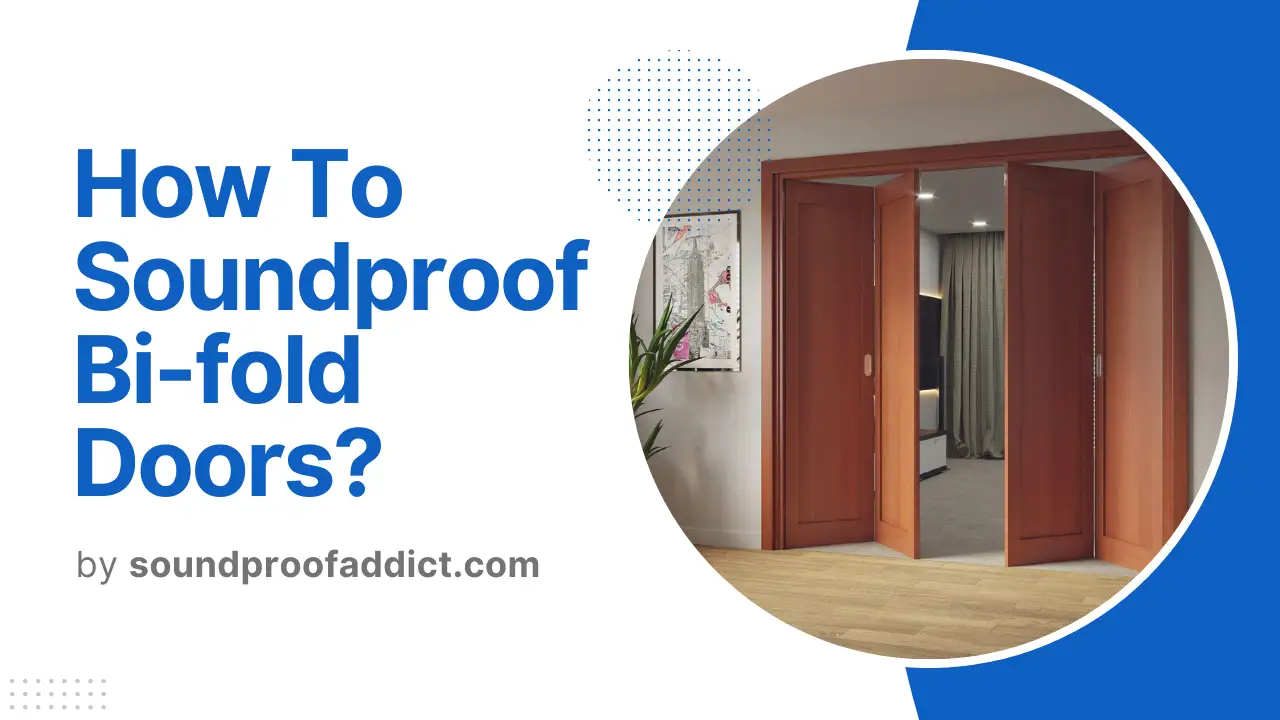
Bifold doors are a fantastic addition to any home, which gives an open, airy feel to your living spaces, even though I have a bifold door in my house.
However, they can also let in unwanted noise, because by nature they are not designed for soundproofing and has gaps and seams, and a lack of solid insulation as well.
But anyway, if you have bifold doors and it is loud then stop worrying now.
In today’s how-to post, I am going to talk about how to soundproof bifold doors and reduce noise effectively with 7 proven techniques.
Whether you want to soundproof bifold closet doors, laundry doors, or internal bi-fold doors, this article is going to be super helpful for you.
It is time to dive in..
Are bifold doors soundproof?
Bifold doors are not typically designed to be soundproof, but they do provide some level of soundproofing depending on their construction and the materials used.
The soundproofing capability of bifold doors largely depends on the quality of materials and construction. High-quality, solid-core doors with proper sealing will help reduce noise better compared to lightweight or hollow-core doors.
Bifold doors also have glass panels, which can allow sound to pass through, but how much noise will pass depends on the glass type.
Doors with double or triple-glazed glass tend to provide much better soundproofing compared to those with single-pane glass.
7 Proven Ways to soundproof a bifold door
Here are the 7 proven ways to sound insulate a bifold door.
1: Seal all the gaps by weatherstripping, caulking and installing a door sweep
When it comes to reducing noise through door, any gaps are your enemy. Whether it is tiny or big, it can allow sound to pass through.
So before jumping directly on the advanced soundproofing techniques, doing these basic soundproofing tasks is important as they matter a lot.
And it is does not matter whether you are noise proofing a louvered door or any door basically, this step is crucial. By sealing these gaps, you can prevent sound from getting through, which helps keep your room more peaceful.
How to seal gaps in bifold doors?
Here how you can seal gaps in your bi-fold door to make it soundproof:
Weatherstripping:
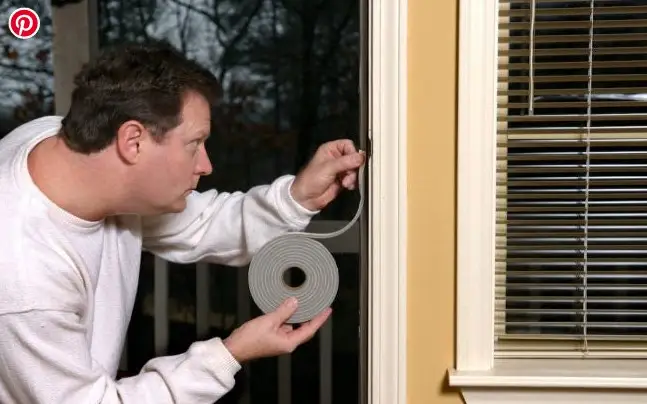
As you already know, it is a soft, sticky tape that you attach around the edges of your bifold door where it meets the door frame.
It forms a snug seal when you close the door, and blocks sound from passing through the gaps. Simply measure the length you need according to your door dimensions, cut it, peel the backing off and press it onto the door frame.
Acoustic Caulking:
Caulk is like a thick, gooey substance that is used to fill in any gaps or cracks in the door frame for soundproofing the door.
It acts as a sound barrier and helps you reduce the outside noise coming into your home. Apply acoustic caulk along the door jamb and give it a few hours to dry.
Door Sweep:
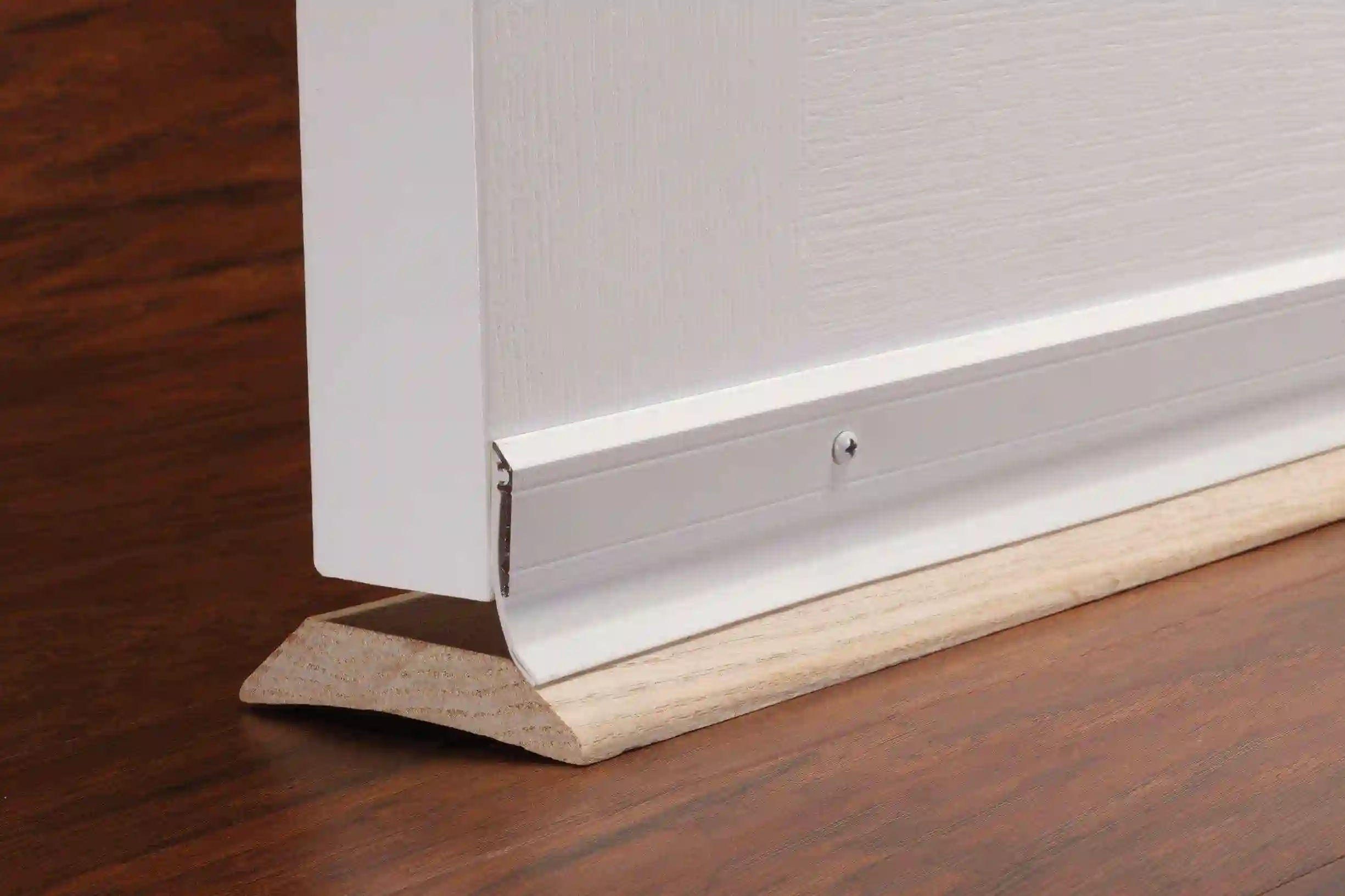
A door sweep is a flat strip, attached to the bottom of the door with the intent to seal your door against air, water, pests and sound.
It hangs down and touches the floor when the door is closed, sealing the gap between the door and the floor and helping you soundproof your bifold door. Simply screw it onto the bottom of your door.
However, you need to be careful while installing a door sweep because a bifold door folds in half when it’s opened so you need the measure and cut the door sweep according to the folded panel and then screw the door sweep on that panel of your bifold door and do the same with another panel. And be more careful with the measurement and installation if your door has more than two panels.
2: Use Acoustic panels
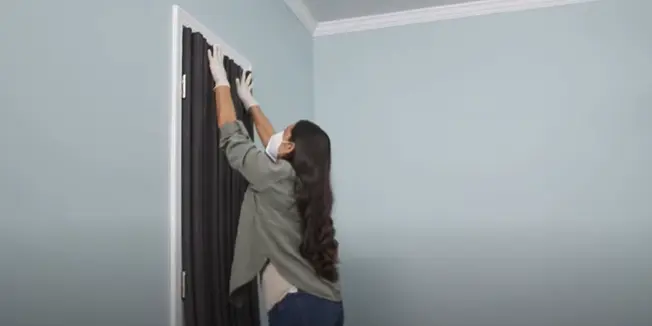
Using acoustic panels is an affordable and popular solution for soundproofing barn doors, soundproofing internal doors and other types of doors as well including bi-fold doors.
Acoustic panels are typically flat or three-dimensional panels made from materials that have excellent sound-absorbing properties such as foam, fiberglass, mineral wool, fabric-wrapped panels and perforated wood as mentioned by burtonacoustix.com.
Acoustic panels are somewhat affordable but they are not super effective. They may reduce the noise level by 8 to 30 dB depending on the frequency of the sound.
Acoustic panels are more effective at reducing high-frequency sound and less effective at low-frequency sound. In addition, the material and the quality of that material also have a big hand in how much noise it can reduce.
To use acoustic panels to soundproof a bifold door. Purchase acoustic panels by measuring the dimensions of your bifold door to cover it completely and attach them to your bifold door’s panels by peeling off the backing from the acoustic panels since most of them come with adhesive backing.
So acoustic panels can be a great way for bifold doors noise reduction, however, if your bifold door panel’s width is less than 12 inches then this option might not be for you as there is hardly any acoustic panels available in size less than 12 inches
3: Use soundproofing curtains
Soundproofing curtains are super versatile, from sound-insulating a sliding glass door to roll-up garage door soundproofing, you can use it for any door.
Recently we conducted a test to figure out how much noise can soundproof curtains actually reduce. We found that a 3-layer curtain that is made for noise reduction can lower noise by approximately 24 dB, this is huge!1
Alright, soundproofing curtains work super well. Now, how would you use them to make your folding door soundproof?
So to do this, first, look for a top-quality curtain that is designed for sound reduction. Look for one that is made up of velvet and has at least 3 layers.
And once you have your curtain in hand, hang it on a curtain rod above the bifold door. Keep in mind that the curtain is installed securely to prevent any gaps where sound could pass through. And you are good to go!
A good-quality noise reduction curtain may cost you as little as $20 to up to $150 or more depending on your bifold door size. This is the cheapest soundproofing technique for bifold doors with glass and is the best technique for soundproofing internal bifold doors.
4: Attach mass-loaded vinyl with a plywood sheet
Attaching the combination of mass-loaded vinyl and plywood is an effective technique for noise-proofing bifold doors, especially if you are trying to prevent noise through a hollow door.
This method of soundproofing can provide a noise reduction of around 20-30 decibels (dB) or more, depending on the thickness and the density of the plywood.
Here is how you can go about attaching mass-loaded vinyl and with a plywood sheet.
Materials You’ll Need:
- Mass-loaded vinyl (MLV)
- Plywood
- Screws
- Screwdriver or Drill
- Measuring Tape
Step 1: First, measure the dimensions of your bifold door panels accurately. Then, cut the MLV and plywood sheet to match the size of the door panels using a measuring tape and cut the MLV with a utility knife and cut the plywood sheet using a plywood cutting tool.
Step 2: After cutting, attach the MLV to the plywood sheet using staples.
Step 3: Now, place the MLV-covered plywood sheet onto the bifold door panel, aligning it correctly. The plywood side should be facing outward, creating a sandwich-like structure: bifold door panel + MLV + plywood sheet.
Step 4: Using screws appropriate for wood (typically wood screws), secure the MLV and plywood to the door panel. Start by placing screws around the edges, about 2-3 inches from the edge, and then add additional screws evenly across the surface.
Step 5: Bifold doors have multiple panels so repeat the same process for each one.
This bifold door soundproofing technique may cost you anywhere from $120 to up to $300 depending on the size of the panel of your door and the number of panels your door has.
Mass-loaded vinyl comes in roll and is not that expensive, it may cost around $50 to $100, while plywood prices depend on the type and thickness but can range from $7 to $90 per sheet according to Lowes.com
Related: How to make washroom door soundproof?
5: Replace the glass with double or triple glazing
Replacing the glass in your bifold door with double or triple glazing is highly effective in terms of noise reduction and improves energy efficiency as well.
The multiple layers of glass and the insulating space create a barrier that helps block noise and improves thermal insulation.
According to sheetwaterglass.com, double glazing can provide a noise reduction of around 35 decibels (dB) or more, depending on factors like the thickness of the glass, the space between the panes, and also the type of gas (e.g., argon or krypton) used to fill the space.
This bifold door noise reduction method is super effective, however, it is also super expensive. According to realhomes.com, double glazing can cost between $30 and $35 per square foot, and triple glazing is even more expensive.
Keep in mind that hiring a professional for installation will add to the overall cost. Replacing the replacing glass is a complex task and needs experienced professionals to ensure the job is done correctly. Hiring a professional may add an additional cost of $60 to $150 or more.
Related: How much it cost for soundproof doors?
6: Install a window inserts
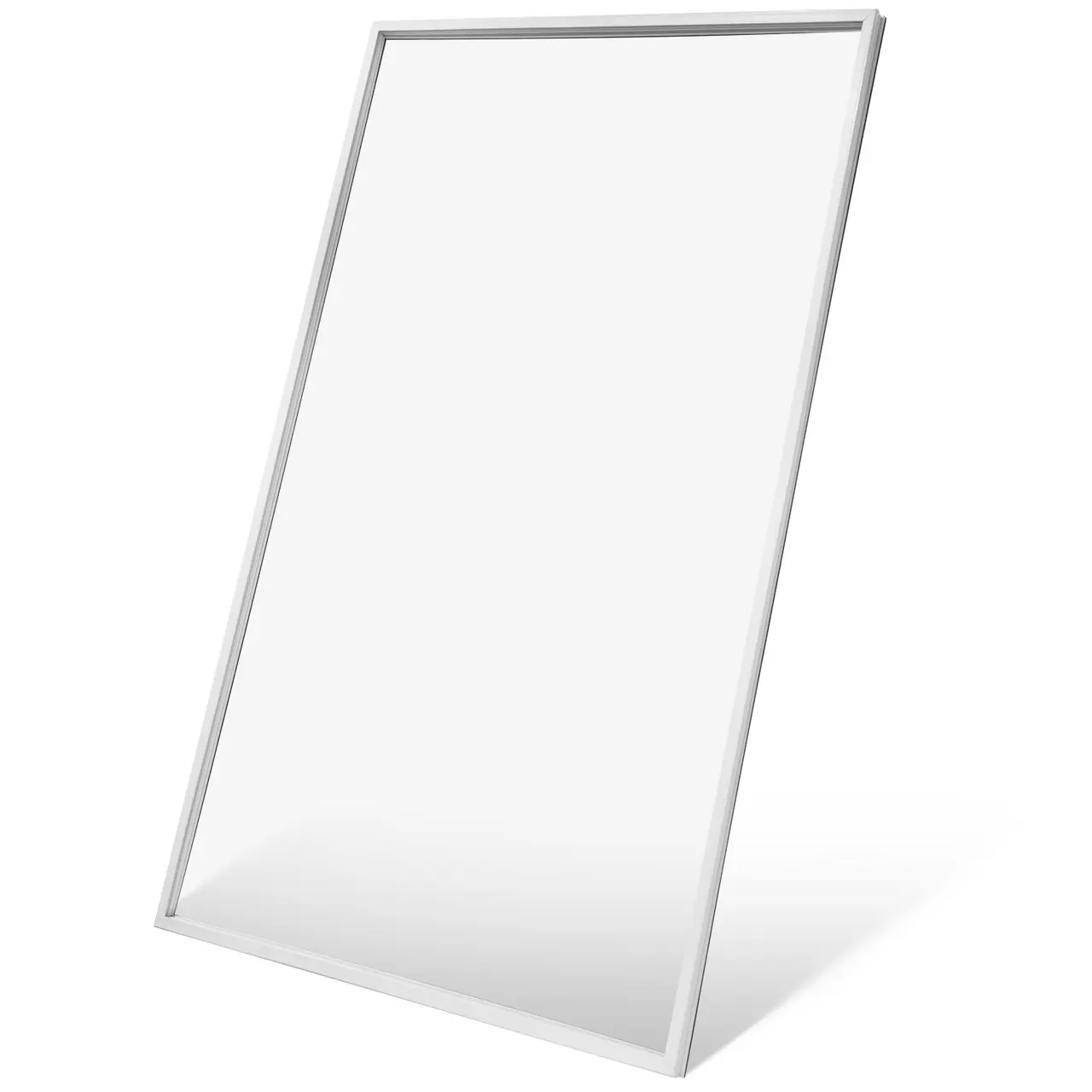
Installing window inserts is a practical solution for soundproofing a glass bifold door. Window inserts are removable panels made from materials like acrylic or laminated glass. They are designed to fit snugly into the existing frame of a glass door or window.
These inserts are pretty effective at reducing even low-frequency noise. They can reduce the noise by up to 25 decibels (dB). The cost of window inserts varies heavily depending on the size, and the material.
On average, you can expect window inserts to range in price from approximately $150 to over $1000, depending on the size of your glass bifold door and the number of inserts required. This is a lot but it works like crazy!
Keep in mind that if you’re not comfortable with DIY tasks, you may need to hire a professional for the installation to ensure it’s done correctly, which will add to overall cost.
Beyond bifold door, window inserts can also be used to soundproof a French door or any door with glass window.
7: Upgrade the door’s hardware
Upgrading the hardware on your bifold door is a practical step that can improve both its functionality and make your bifold door quieter.
Quieter and smoother-operating hardware can reduce noise generated by the door’s movement and can also make it easier to open and close the bifold door.
Types of Hardware Upgrades in a bifold door.
- Hinges: Upgrading to heavy-duty, noise-reducing hinges can minimize creaking and ensure smooth door operation.
- Rollers and Tracks: If your bifold door has rollers and tracks, consider upgrading them to high-quality, quiet-running versions.
So go and upgrade the hardware of your door and trust me it will make more difference than you think.
Related: How to prevent noise through a pocket door?
How to soundproof bifold closet doors?
To soundproof bifold closet doors, apply weather-stripping tape along the edges of the bi-fold doors to seal any gaps and prevent sound leakage. In addition, install acoustic panels on your closet’s bifold doors.
These panels will absorb sound and reduce its impact on the room. For get more soundproofing benefits, consider using noise-reduction curtains that can be hung over the closet doors.
If you are really serious about reducing noise transmission through your closet door, then think about replacing your closet’s hollow-core doors with solid-core doors. Solid-core doors are naturally effective at blocking out sound.
How to soundproof bifold laundry doors?
In my opinion, for soundproofing bifold laundry doors, the best option is to install soundproofing curtains or acoustic panels on your door itself. This option can help reduce high-frequency sound to a certain extent.
However, for more effective sound reduction, consider installing industrial acoustic blankets or even replacing the door with a soundproof door.
These options require a more significant investment but can provide superior soundproofing results for your laundry area.
Conclusion
Bifold doors are a stylish addition to any home, but they are not well soundproofed. To reduce the noise passing through your bifold door, you can consider the techniques that I have mentioned above.
From those techniques, what I think is the most effective is attaching a layer of mass-loaded vinyl and plywood to the door using screws.
Another great way to soundproof it is to hang curtains that are made for noise reduction. If you have a glass door then think about installing window inserts on the glass window of your bi-fold door or replacing the glass door with double or triple-glazing.
You can also consider replacing your door with a solid-core door if your bifold door is hollow-core.
That’s it for this post. Go and use the technique that your soundproofing needs and budget and get the peace you deserve. Thanks for reading the post and coming down to here.
Related: Reduce noise through condo door
